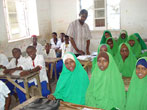SOAWR: Lessons we have learned

Five years after the Protocol on the Rights of Women in Africa came into force, the campaign to ensure that it is implemented and enforced across the continent continues. Faiza Jama Mohamed looks at SOAWR’s strategy for future advocacy, in light of the experience it has gained.
As Africa marks the fifth anniversary of the entry into force of the Protocol to the African Charter on Human and Peoples’ Rights on the Rights of Women in Africa on 25 November 2010, several members of the [email protected] or comment online at Pambazuka News.
NOTES
[1] M. Robinson ‘Foreword’ in D Buss & A Manji (eds) International law: Modern feminist approaches (2005); C Chinkin et al ‘Feminist approaches to international law: Reflections from another century’ in Buss & Manji 17 26 28.
[2] K.Y. Amoako, Former Executive Secretary of the Economic Commission for Africa (ECA) Opening statement during the 7th African Regional Conference on Women Ministerial Conference on the Decade Review of the Implementation of the Dakar and Beijing Platforms for Action Addis Ababa, Ethiopia. 12 October 2004
[3] FAMEDEV is an African organization that focuses on the following areas: · Training and Capacity Building for media practitioners and communicators especially women and young people; Documentation and dissemination of innovative practices using media for development- covering the ‘usually forgotten’ issues and giving a voice to the voiceless and the marginalized · Mentoring and Exchange programmes for young and upcoming media practitioners and students within sub regions and across regions in Africa.
[4] Akina Mama wa Afrika (AMwA) is a pan-African, non-governmental development organisation whose aim is to provide development services for African women, serves as a resource and research forum on African women's issues, and provides a platform for African women to participate in policy and decision-making. AMwA is an NGO in consultative status with the UN Economic and Social Council.
[5] Women’s Rights Advancement and Protection Alternative, (WRAPA) is a registered non-governmental, non-political, non-profit charitable membership organization founded in 1999. Our activities include legal aid and counseling services for women, mobilization and sensitization, skills training and advocacy for legal reforms. In pursuance of our vision for enhancing access to justice for women WRAPA supports litigation for women within the three legal systems in Nigeria.
[6] Algeria, Botswana, Burundi, Cameroon, Central African Republic, Chad, Côte d’Ivoire, Congo, Egypt, Equatorial Guinea, Ethiopia, Eritrea, Gabon, Guinea, Madagascar, Mauritius, Niger, Sahrawi Arab Dem. Republic, São Tomé and Principe, Sierra Leone, Somalia, Sudan, Swaziland and Tunisia.
